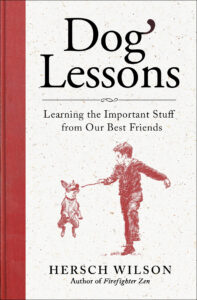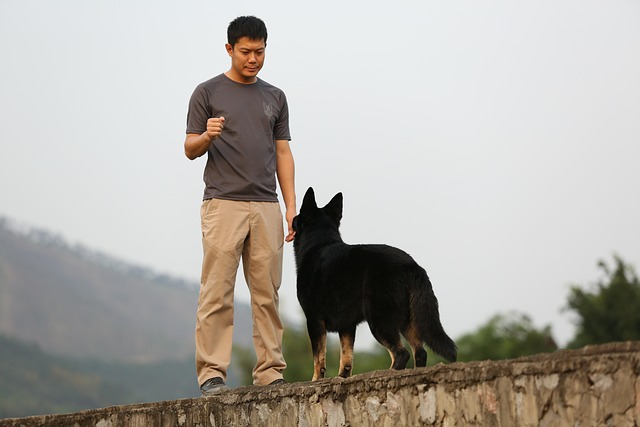Hersch Wilson is the author of Dog Lessons and Firefighter Zen, an organizational consultant, pilot, former professional dancer, newspaper columnist, and volunteer firefighter. He lives in Santa Fe, New Mexico, with his wife, Laurie; two daughters; and two dogs, a Great Pyrenees and a Chihuahua-terrier mix.
In this world beset by crisis, why a book about dogs?
First, this beautiful line in the Talmud, “Do not be daunted by the enormity of the world’s grief. Do justly, now. Love mercy, now. Walk humbly now. You are not obligated to complete the world, but neither are you free to abandon it.”
In other words, even in times of soul-wrenching crisis, we have a role to play; we need to be part of the solution. Even though we often feel powerless, we’re not.
And at the same time, we crave companionship, community, and solace. Although that often means human companionship, our dogs can play a role: they greet us enthusiastically when we come home, whether from the store or a protest march. They sit on the couch with us with their heads on our laps. They mirror our emotional states. No matter what is going on “outside,” they just want to be with us. Having a dog present in our lives is a great gift, especially in times like ours.
You write that dogs can teach us lessons. What are some examples?
There are the obvious ones, like love and the sheer enthusiasm of going on a walk. And there are others. Dogs, for example, teach how not to get into a fight (most of the time). One of my favorites is their ability to be endlessly curious— even on the same walks we do every day. Then there is the love of wild spaces and their importance to our sense of being. Next is the desire to be free, even if, in our case, it means our Great Pyrenees, Toby, crashing through fences or screen doors. There is the importance of naps, something we seem averse to as busy 21st-century on-the-go humans. (continued)
I cover more in the book, but the last one I’ll leave you with here is old dogs teach us how to be old.
What does it mean to be a dog guardian? Why do you dislike the word “owner?”
“Owning” implies that I can do anything with the “object” I own. I can ignore it, take it for granted, and dispose of it if it tires me or I no longer have time. I believe deeply that we can’t “own” sentient beings. Sentient beings have moral standing. The philosopher Mary Ann Warren wrote, “If an entity has moral status, then we may not treat it in just any way we please.” “Guardian” implies that my job is to keep a dog safe and happy, protect them from harm, and respect their needs and wants.
How has being with dogs changed your view of the natural world?
First, dogs get me out in the natural world. They are excited to go on walks on our rural roads or hikes in the mountains. Second, once we let go of our preconceived notions of “dog,” it’s not a leap to understand that the natural world is full of sentience and hard-won evolutionary wisdom. The poet W.B. Yeats wrote, “The world is full of magical things patiently waiting for our senses to grow sharper.” Being with a dog in the wild wakes up our ability to sense the wild in a different and fuller way.
You write in the book that breeds aren’t good indicators of behavior. Can you explain?
Any dog’s behavior is a product (like human children) of their genetics and environment. On our road, we have an amazing Golden retriever, Cooper. He’s friendly and calm. Much of that comes from breeding. But also because he lives with a caring and kind guardian. If you put Cooper in an abusive environment, especially as a puppy, you’d get different behaviors. My brother has a rescue Pitbull named Baron. Who knows how he was treated early on? But Joey and Linda are kind and patient guardians. Baron has issues with other dogs but is friendly with humans and fun to be with. Always look at the individual dog, not just the breed. (continued)
What makes a dog aggressive?
Fear makes dogs aggressive. When you think of what we can control as guardians, if we contribute to an environment that creates fear, you’ll get an aggressive dog, for example, chaining a dog, where they can’t escape or find shelter. Relying on punishment (an ineffective training strategy anyway) where the dog is afraid of you — tucks her tail, ears flattened when you approach, will create aggression. Or cornering a dog, where they can’t escape, also will cause aggression. In my view, the key is to create a positive and trusting relationship.
What is your most important lesson from writing Dog Lessons?
After decades of being with dogs, I thought I knew a lot. Doing the research for this book changed my mind. The most important lesson I learned was about rescues. I believed the first few months of a dog’s life set in stone how they would “be” as a dog later, their behavior, like fear, resource guarding, barking, etc.
Doing the research, and the experience with our two current rescued dogs, Toby and Maisie, taught me that dogs are much more resilient. They can bounce back from tough “puppy hoods” to be friendly dogs. Well, Toby did. Maisie is part Chihuahua and is easily irritated. We’re still working on her; she’s a work in progress. But dog resilience is my number one lesson.
Why is it so hard to lose a dog? Is it okay to grieve the loss of a dog?
Because we’ve evolved. I grew up in a time and placed where it was common to put unwanted puppies in a sack and throw them in the river. Since then, I think collectively, we’ve come to understand that dogs are sentient beings. And they have feelings, like sadness and joy — acknowledging that would’ve gotten you excommunicated from most psychology departments as recent as thirty years ago.
And more simply, we love our dogs, and they love us. They have short but vibrant lives; they become part of our daily existence and routines.
It’s because we allow ourselves to love them that it is devastating when they pass away. And it is natural and healthy to grieve. No one should tell you otherwise, how to grieve, or “get over it.” It is a deeply personal experience.

Learning the Important Stuff from Our Best Friends
Hersch Wilson
A heartwarming meditation on the powerful presence of dogs in our lives
and the transformative lessons they can teach us about love, loyalty, grief, and more,
from the author of Firefighter Zen
“Dog Lessons is a truly beautiful book and a must-have for any dog lover’s library. It’s the kind of book that makes you want to snuggle your furry best friend closer than ever out of gratitude and awe.”
—Laura T. Coffey, author of the national bestseller My Old Dog: Rescued Pets with Remarkable Second Acts
“When in doubt, walk your dog” is the first of many valuable maxims in Hersch Wilson’s remarkable Dog Lessons. The follow-up to his acclaimed Firefighter Zen, this is not a training manual for dog owners, nor a primer on the latest in animal behavioral science (as he readily admits, he’s a pretty lousy dog trainer). It is instead a blend of memoir and clear-eyed meditation on these fellow pack animals, a heartfelt reflection on what dogs can teach us when we open ourselves enough to listen and learn.
After more than sixty years living and working with dogs (Wilson is a volunteer firefighter and, along with his wife, a boutique pet store owner), he began writing a column about dogs for his local paper in Santa Fe in 2013. The 120 (and counting) entries — filled with self-deprecating stories and lighthearted musings on a life filled with fur-covered furniture, unexplained messes, and destroyed property — evolved into a decade-long meditation on the truths dogs have to teach us. From universal values like loyalty and curiosity to practical lessons on napping, playing, and avoiding a serious fight, it’s eminently good advice.
Readers of all types, from the most ardent animal lovers to the simply dog-curious, stand to benefit from the insights in Dog Lessons. As Wilson himself acknowledges, the most significant lesson dogs teach is that “life is short” and “we must celebrate life. It is the way, the only way.”
Hersch Wilson is an organizational consultant, pilot, former professional dancer, and volunteer firefighter. He writes a monthly column on dogs for the Santa Fe New Mexican, has published articles and done presentations on PTSD and firefighters, and is the author of Play to Win and Firefighter Zen. His wife Laurie owns and runs an award-winning, popular boutique pet store. They have two daughters and currently two dogs: a Great Pyrenees named Toby and a Chihuahua-terrier mix named Maisie. They live in Santa Fe, New Mexico. More information at HerschWilson.com.
Dog Lessons: Learning the Important Stuff from Our Best Friends
Publication date: September 5, 2023
Dogs • $24.95 • Hardcover • 288 pp. • Black-and-white illustrations
ISBN: 978-1-60868-887-6
Special thanks to New World Library






I’ve learned a lot from my dog especially “Unconditional Love“.
Such a delightful quote: “Do not be daunted by the enormity of the world’s grief. Do justly, now. Love mercy, now. Walk humbly now. You are not obligated to complete the world, but neither are you free to abandon it.”
In a world often consumed by the pressure to achieve and conquer, it is easy to feel overwhelmed by the enormity of global issues. However, within this quote lies a powerful reminder: we may not be obligated to solve all the world’s problems, but we are also not free to turn a blind eye. There is an intrinsic call for compassion and empathy that invites us all into action, even if on a small scale.
What this quote truly signifies is that every individual possesses the capability to make a positive difference in the world. It encourages us not to be disheartened by our perceived limitations or our inability to bring about sweeping transformation. Rather, it reminds us that change can begin within our own communities, our own families, by simply offering kindness and understanding to those around us. It is through these small acts of love and compassion that a ripple effect can occur – spreading outwards from person to person until it reaches corners of the world previously untouched by positivity.
Ultimately, this beautiful quote inspires us not only to consider how we can contribute positively but also ensures that none of us become passive observers in the face of injustice or suffering. Each one of us has unique skills, talents, and passions waiting to be shared with the world for its betterment. So let these words serve as a gentle nudge reminding you that while you may not be able single-handedly change everything; your actions matter greatly in shaping society’s collective journey towards progress and harmony.